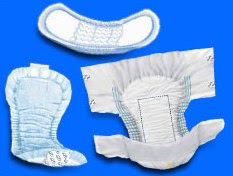According to a University of Michigan Health Systems study conducted in 2008, African American women experience urinary incontinence less than half as often as Caucasian women. However, the study found that when incontinence does occur, the condition is usually worse than in white women. Black women experience a heavier flow of urine leakage during each occurrence of incontinence, sometimes to the point of noticeable wetting of their pants compared to only one third of white women.
The medical community has always believed that African American women don't experience stress incontinence, or urine leakage during exercise, coughing, laughing or any activity that increases pressure in the abdominal area. Those with stress urinary incontinence have inadequate strength of the pelvic floor muscles. The U of M study proved otherwise. Black women do experience stress urinary incontinence, but may not have been diagnosed because of the common held belief that they don't.
The study also found that African American women experience urge incontinence twice as often as Caucasian women. Urge incontinence, also known as overactive bladder, is characterized by the sudden contraction of the bladder's muscular wall causing the urgency to use the bathroom and involuntary urine leakage. Fast movements often trigger urge incontinence and it can be acquired as a result of pregnancy.
In the past doctors also believed that the medical conditions that influence the occurrence of urinary incontinence are different between black and white women. The U of M study found that this is not the case. Those conditions, such as constipation, diabetes, obesity, chronic lung disease and depression were found to be the same in both races and cause urinary incontinence to occur at comparable rates between the two.
Numbers from the University of Michigan Health Systems study:
* The study included over twenty eight hundred African American and Caucasian women from three southeastern Michigan counties
* 27 percent of the women surveyed experienced moderate urinary incontinence
* Of these women experiencing moderate urinary incontinence, 14.6 percent were African American women and 33.1 percent were Caucasian women
* 25 percent of black women with moderate incontinence experience stress incontinence compared to 39 percent of white women
* 24 percent of black women with moderate incontinence experience urge incontinence compared to 11 percent of white women- 51 percent had a combination of both stress and urge incontinence
* The ages of women in the study ranged from 35 to 64 years old. The average age was 42 and around 70 percent had delivered at least one child vaginally
Overall, the study demonstrates that in the moderate category white women have significantly higher incidences of incontinence; black women may experience incontinence less often but at a higher severity. The study also showed that African American women have higher incidences of urge incontinence and that Caucasian women have higher incidences of stress incontinence.
Regardless of your frequency and level of bother, managing urinary incontinence is made easier than ever before. New gender specific products have become recently available in hospital grade protection. Health care centers and medical equipment supply companies can provide you with a discreet fit and the proper protection level. Products, in ascending protection level, that help you manage urinary incontinence include: pads and liners; incontinence pants paired with a pad or liner; underwear, also known as pull-ups; and briefs, commonly known as adult diapers. A reputable health care center and medical equipment supply company will treat you to personal customer service to help tailor your product purchases to your unique situation. They are available continuously through toll free phone numbers, in stores or online.
A few health care centers and medical equipment supply companies also offer discreet incontinence supply home delivery programs. You save money by utilizing their "try-before-you-buy" sample programs and receive meaningful discounts for ordering your urinary incontinence products in volume. In addition, you also save time by having them delivered right to your doorstep each month.
Understanding your condition and the wide variety of products used to manage urinary incontinence is empowering. Stay active and feel confident knowing there are a wide range of hospital grade protection choices. The sooner you find the protection right for you, the sooner you can get on with your life.
About Binson's Home Health Care Centers
Binson's Home Health Care Centers began as Binson's Pharmacy in Center Line, Mich. during the 1950's and grew to the home health care center it is today. Currently, there are Binson's retail outlets in both Michigan and Florida. With continuously updated products and services and new locations, Binson's is destined for exceptional dynamic growth in home health care. For more information about incontinence products and programs call Binson’s at 888-246-7667 and ask for the IP Program, or visit: http://www.binsons.com/
Thursday, February 25, 2010
African American Women and Urinary Incontinence
Posted by
Binson's Home Health Care Centers
at
2/25/2010 03:37:00 PM
![]()
Subscribe to:
Post Comments (Atom)



1 comment:
There's a new treatment for stress incontinence to cause stem cells to generate new healthy tissue. The procedure is called o-shot which has been very effective with my patients.
More can be seen at OShot.info
Hope this helps.
Charles Runels, MD
Post a Comment